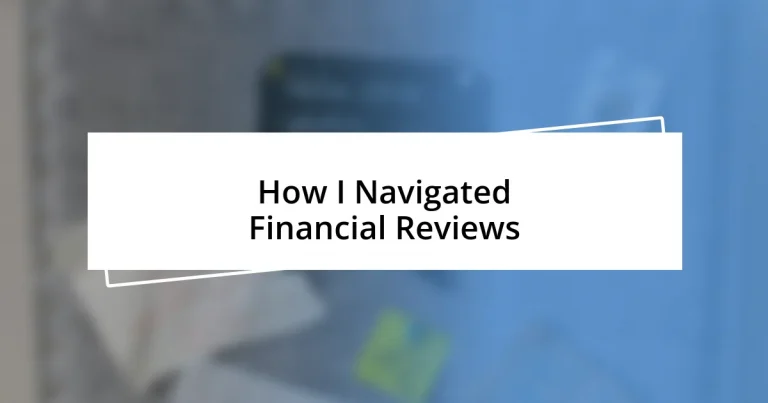Key takeaways:
- Financial reviews are essential for understanding and improving one’s financial health, revealing spending patterns and guiding better decisions.
- Preparation is crucial; gathering necessary documentation and setting specific goals can transform the financial review process and reduce anxiety.
- Engaging with financial experts enhances understanding and builds trust, leading to personalized advice and support in achieving financial objectives.
- Implementing actionable recommendations and regularly following up on progress creates accountability and fosters confidence in one’s financial journey.
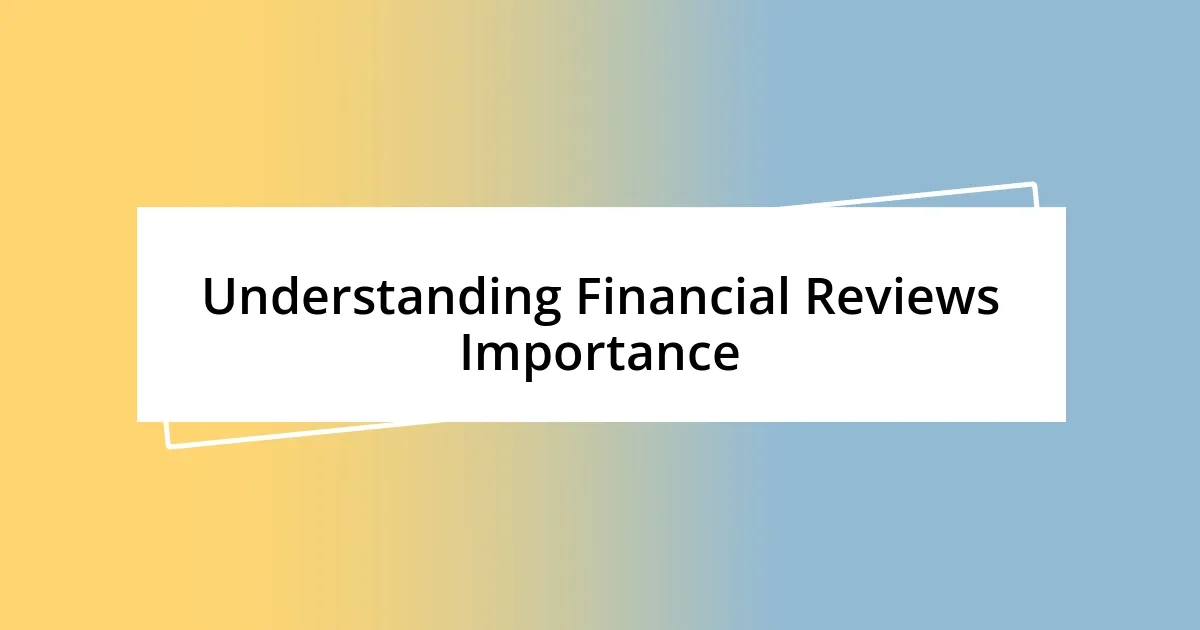
Understanding Financial Reviews Importance
I still remember my first encounter with a financial review; I felt overwhelmed and uncertain. It was as if I were standing at the edge of a cliff, peering into the unknown. However, understanding the importance of these reviews became clear to me when I saw the positive impact they had on my financial stability. Financial reviews offer a snapshot of your economic health and reveal areas in need of improvement. Are you aware of where your money is truly going?
As I dove deeper into my own financial reviews, I discovered patterns in spending that I had previously ignored. This self-reflection not only helped me identify unnecessary expenses, but it also sparked a sense of empowerment—I was taking control of my finances. When I think back, I can’t help but ask: how many missteps have I avoided just by understanding my financial landscape better? Whether you’re managing personal expenses or overseeing a budget at work, financial reviews serve as a compass, guiding you toward better decisions.
Moreover, the emotional weight lifted once I established a rhythm with my financial reviews was profound. I found reassurance in knowing that I could track my progress regularly. It’s easy to dismiss these reviews as tedious; however, they create a crucial dialogue between you and your finances. Are you ready to have that conversation? Understanding this importance can transform the way you view your financial journey.
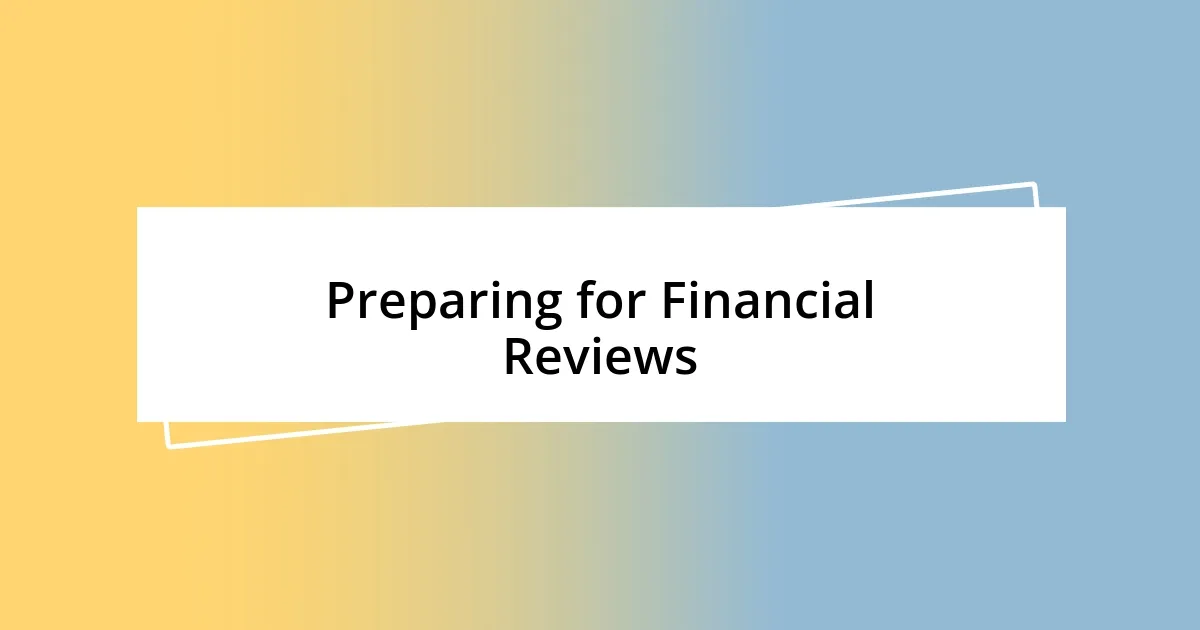
Preparing for Financial Reviews
Preparing for a financial review is like getting ready for a big exam — it requires planning and a thorough understanding of the material. I remember my first few reviews, feeling the need to gather every piece of financial information I could find. It was almost like assembling a jigsaw puzzle with missing pieces. Now, I better appreciate the importance of being organized. Knowing exactly where I stand financially allows me to approach the review with confidence, instead of anxiety.
To make your preparation more effective, consider these steps:
- Gather all financial documents: Collect bank statements, investment reports, and receipts. It’s crucial to have everything in one place.
- Review spending habits: Take time to analyze your previous months’ expenses to identify patterns. This helped me pinpoint areas needing adjustment.
- Set specific goals: Reflect on what you want from this financial review. Whether it’s cutting down debt or saving for a vacation, having clear objectives helps focus your analysis.
- Schedule regular reviews: Consistency is key; I now make it a monthly ritual which keeps me connected to my finances.
- Involve a trusted advisor: Sometimes, another set of eyes helps; I found discussing my finances with a friend brought fresh insights I hadn’t considered.
Taking these steps transformed the way I approach financial reviews, transforming apprehension into a proactive mindset.
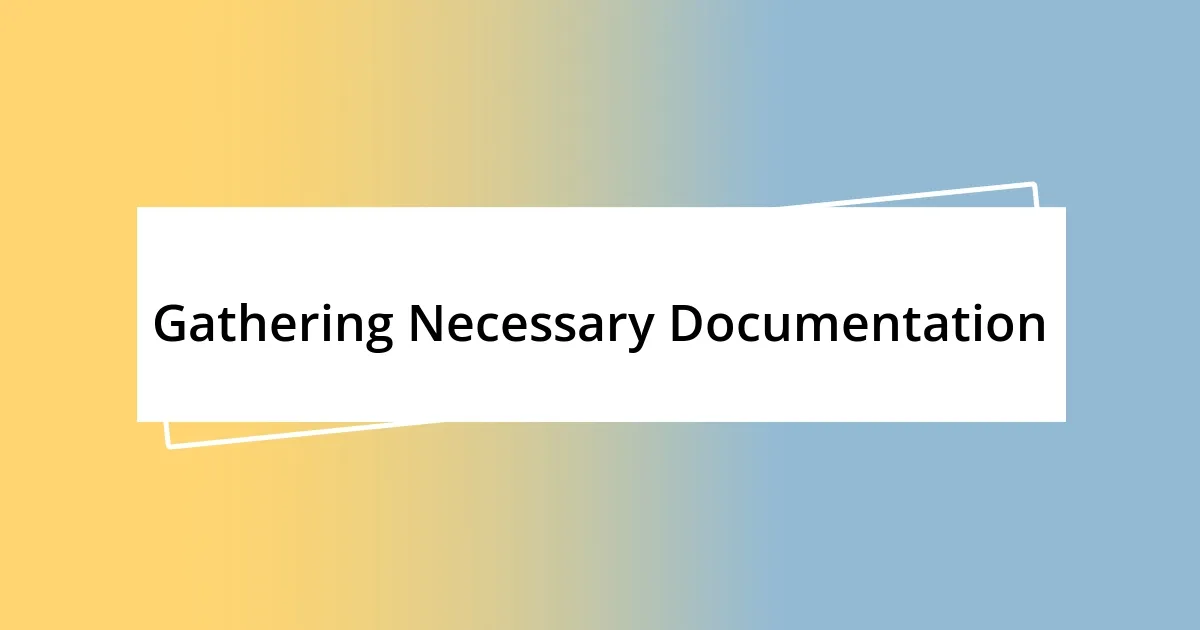
Gathering Necessary Documentation
Gathering the necessary documentation for a financial review feels like piecing together a crucial puzzle. When I first started, I often struggled to find everything I needed—bank statements would be stuffed in drawers, while receipts collected dust in my wallet. I learned the hard way that having everything organized not only saves time but also reduces stress during the review. It’s like having that vital tool—everything at your fingertips, ready to provide clear insights into your financial landscape.
I often recommend starting with the essentials: bank statements, tax returns, and credit card bills. Once I began systematically collecting these documents, I saw an immediate difference. It’s not just about having paperwork; it’s about creating a coherent picture of my financial health. Each document serves a purpose, telling the story of my spending habits and savings. This practice transformed a previously confusing process into an enlightening experience. What I’ve also found is that giving yourself a dedicated space for these documents—perhaps a drawer or a digital folder—makes a world of difference.
Additionally, don’t overlook the need for recent pay stubs, insurance policies, and investment records. I remember finding an old policy that I had forgotten about, which gave me a sense of security I hadn’t realized I was missing. Keeping everything readily accessible not just streamlines future reviews but also allows for proactive planning. Recognizing where you stand financially enables you to make informed decisions, which breathes a new kind of confidence into your financial journey.
| Document Type | Purpose |
|---|---|
| Bank Statements | Detail spending habits and account balances |
| Tax Returns | Provide a snapshot of income and deductions |
| Credit Card Bills | Highlight recurring expenses and interest payments |
| Pay Stubs | Show proof of income and deductions |
| Insurance Policies | Outline coverage and potential liabilities |
| Investment Records | Help track growth and financial goals |
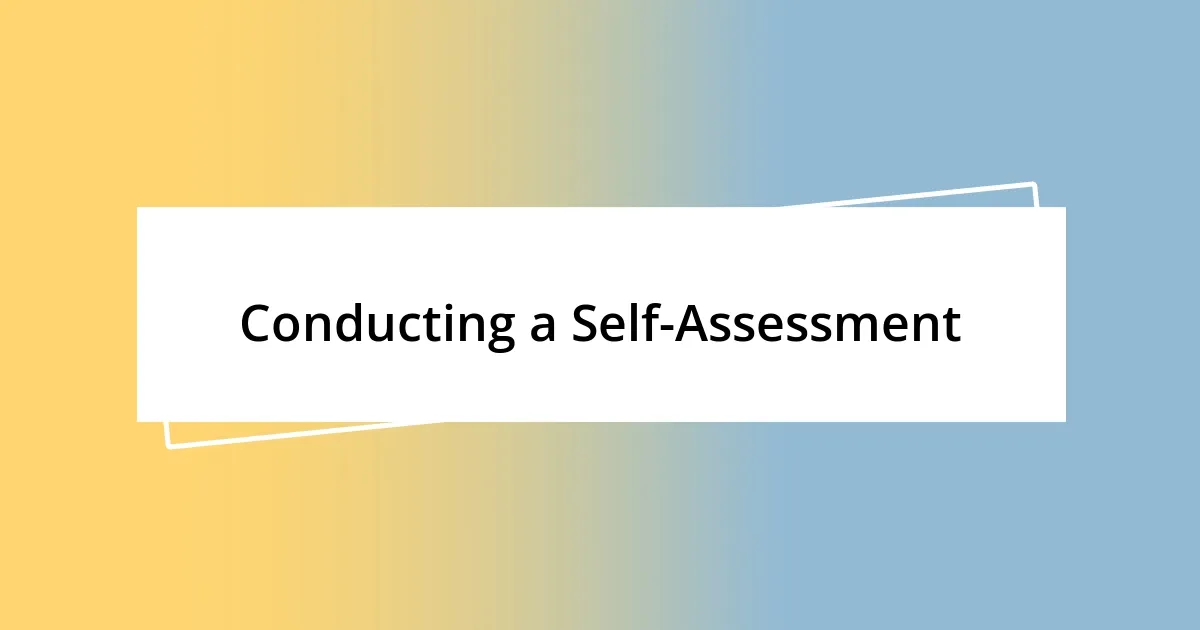
Conducting a Self-Assessment
Reflecting on my financial state always invites a mixed bag of emotions. There are times when I feel proud of my accomplishments, and other moments where anxiety bubbles up as I confront areas needing attention. Conducting a self-assessment isn’t just about numbers; it’s also about grappling with feelings of accountability and vulnerability. Have you ever felt that twist in your stomach when reviewing poor spending choices? I have. It’s hard, but I’ve learned that embracing this discomfort is vital for growing as a financially savvy individual.
To truly understand my financial position, I developed a habit of asking myself pointed questions like, “What am I spending on that doesn’t serve my goals?” This approach has proved enlightening. The first time I did this, I realized just how much I was allocating to dining out instead of my savings. It was an eye-opener! Now, I make it a point to dig deep into my spending patterns, celebrating the wins while also addressing the setbacks. This introspection encourages me to make meaningful changes, ultimately steering me closer to my financial objectives.
I also found that documenting my self-assessment – whether through journaling or creating spreadsheets – enhances my clarity and commitment. Seeing my financial journey laid out visually gives me perspective. It reminds me of progress made and areas still to improve. I often marvel at how this simple practice, combined with self-reflection, empowers me to make choices that align with my values. So, how do you perceive your own financial health? Opening the door to honest assessments could lead to surprising insights and breakthroughs.

Engaging with Financial Experts
When it comes to engaging with financial experts, I’ve learned that preparation is key. The first time I met with a financial advisor, I felt overwhelmed and unsure of what to expect. But I realized that coming equipped with my documents and an open mind made a world of difference. It transformed what could have been a daunting experience into a constructive dialogue. Have you ever walked into a meeting feeling lost? I certainly have, but that first meeting taught me the importance of clarity.
Active engagement is another vital aspect. I remember asking my advisor questions like, “What would you recommend for someone just starting their financial journey?” This question opened up an entire conversation about budgeting strategies and the importance of an emergency fund. Financial experts often have a wealth of knowledge to share, but they can’t guide you if you don’t drive the discussion forward. So, what questions would you raise in a similar setting? Bringing your own queries to the table can lead to unexpected insights that resonate personally.
Lastly, I found that building a relationship with a financial expert takes time and trust. After a few meetings, my advisor and I developed a rapport that helped tune the advice to my specific needs. Trust allows for more honest conversations about my goals and concerns. It’s like having a financial confidant who not only provides advice but also celebrates the small victories with you along the way. Have you ever felt that sense of partnership? It truly adds a layer of support that’s invaluable in navigating your financial reviews.
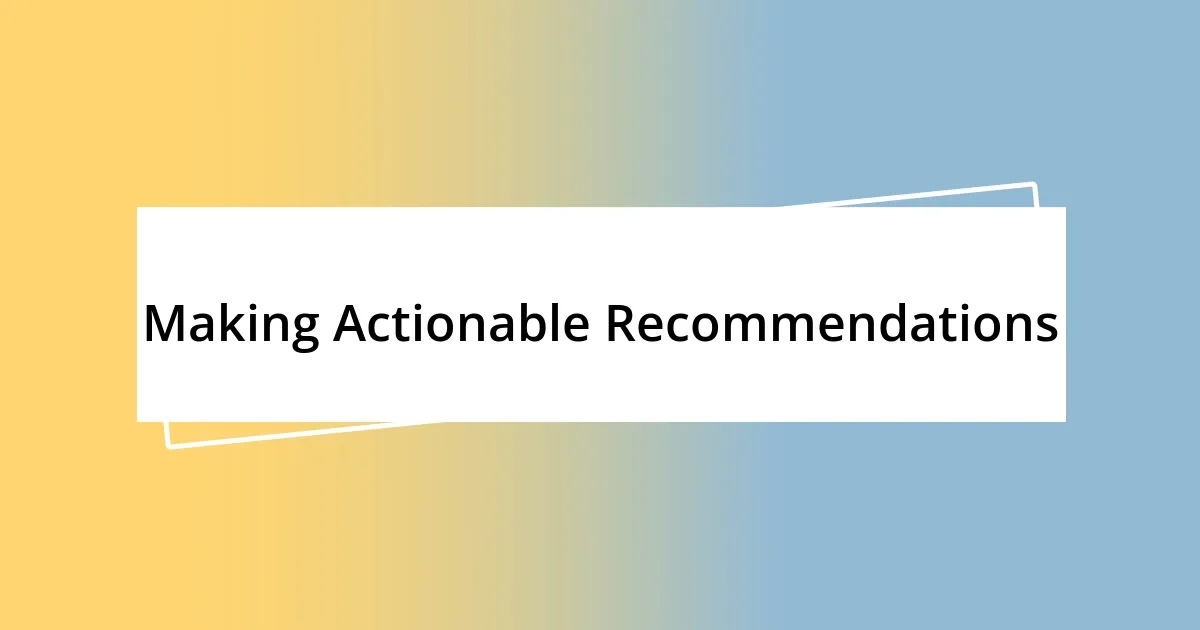
Making Actionable Recommendations
Making actionable recommendations is about turning insights into real-world changes that you can implement in your financial life. I still recall the moment I realized that just pointing out issues wouldn’t suffice; I needed a clear plan. For instance, after identifying my overspending on takeout, I decided to set a monthly budget specifically for food that included cooking at home. The satisfaction of sticking to this budget while enjoying homemade meals? It was like finding a hidden treasure in my own kitchen!
One valuable approach is to create a list of priorities based on your self-assessment results. I did this by taking my biggest areas for improvement and ranking them. For example, improving my credit score soared to the top of my list. By focusing my energy on one actionable item at a time, like paying down credit card balances, I could see tangible progress. Have you ever felt overwhelmed by your financial goals? Breaking them down into manageable tasks can transform that feeling of chaos into a roadmap of success.
Lastly, I always keep a reflection journal on my recommendations. After each month, I jot down what worked well and where I stumbled—like the time I forget to plan for a family outing, which pushed my entertainment budget off course. This practice not only helps me fine-tune my approach but also serves as a gentle reminder of the lessons learned. It’s a way to hold myself accountable while also celebrating my progress. What actionable steps are you considering for your financial health? Remember, the key is to keep it simple and maintain flexibility; life often throws unexpected curveballs!
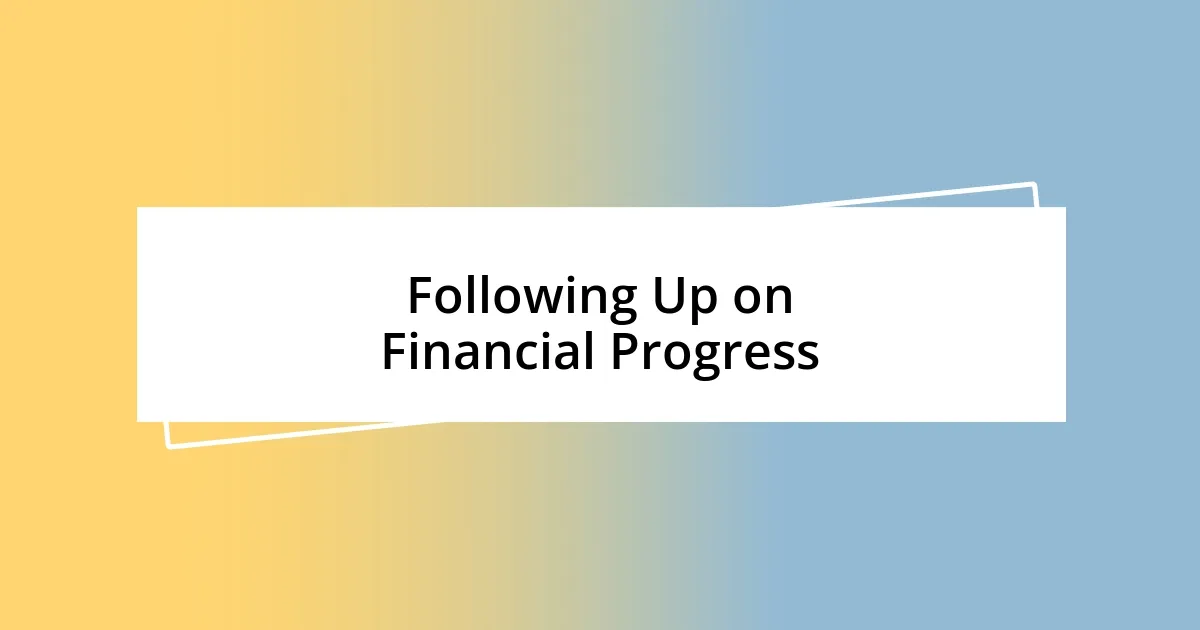
Following Up on Financial Progress
Following up on financial progress can feel a bit like tending to a garden; it requires consistent attention and care. I remember after implementing some recommendations from my advisor, I set reminders to review my financial status every month. This ritual not only kept me accountable but also allowed me to track my improvements over time. Have you ever noticed how small, seemingly insignificant changes can lead to major growth? It’s those little check-ins that often reveal surprising progress.
As I conducted my monthly reviews, I became more comfortable with the numbers. At first, I was intimidated by my budget sheet, but slowly I began to see it as a tool rather than a barrier. I recall the exhilaration I felt when I discovered that my savings rate had jumped significantly! It felt empowering knowing I was actively shaping my financial future. Do you take the time to celebrate these small victories? Acknowledging progress, no matter how minor, can be the boost we all need to keep pushing forward.
Moreover, I realized that following up isn’t just about analyzing figures; it’s about connecting emotionally with my financial journey. There was a moment when I revisited a goal I had initially deemed unrealistic—a dream vacation. Through my follow-up reviews, I recognized that consistent saving had brought this dream closer to reality. Reflecting on those moments makes me realize how important it is to align my financial goals with my personal aspirations. Aren’t financial plans much more motivating when they serve a deeper purpose? The blend of strategic reviews and personal meaning can truly enhance our financial narratives.












